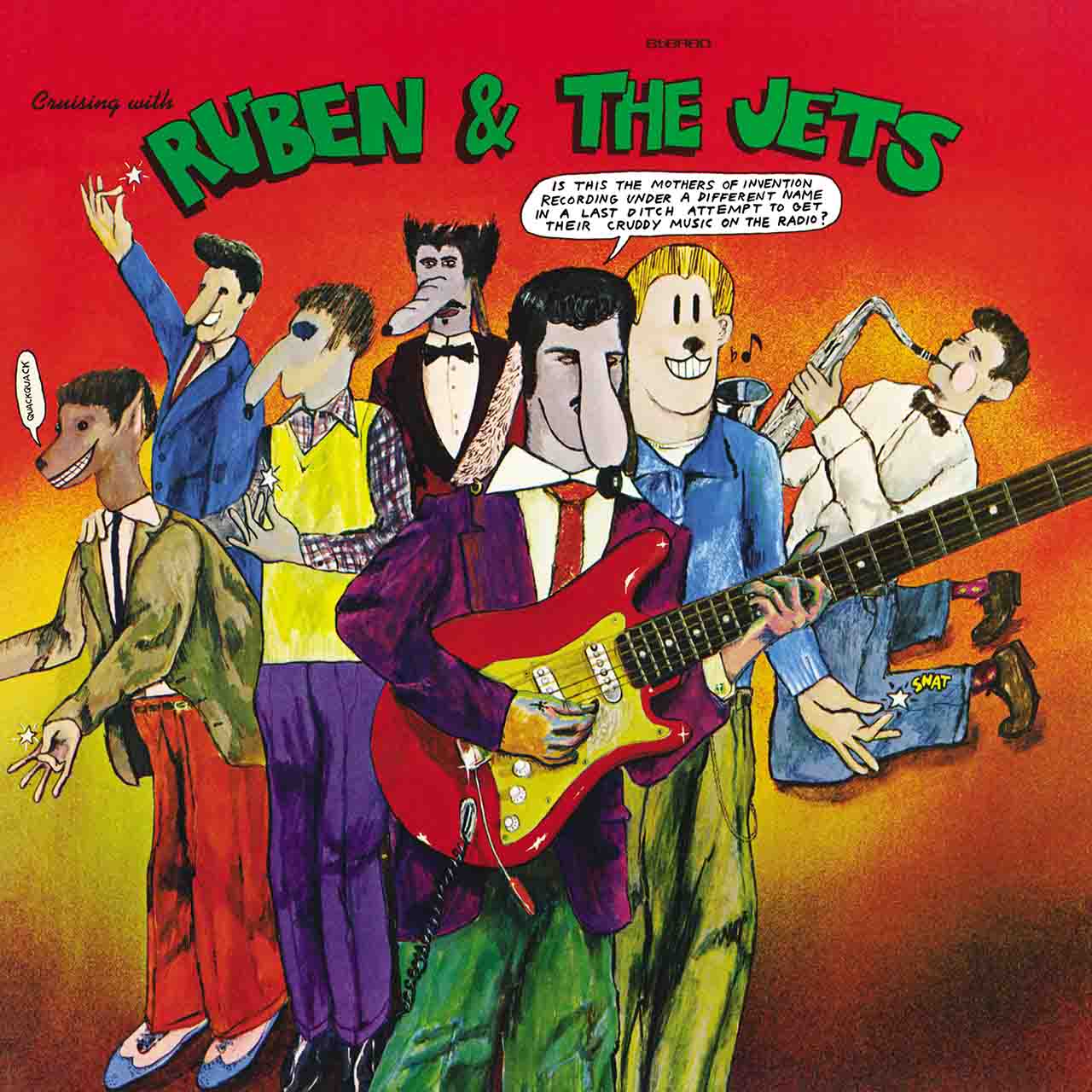When Frank Zappa unveiled his second album of 1968 – credited to the (fictional) Ruben & The Jets – fans might have been forgiven for thinking it was a joke on the composer’s part. Cruising With Ruben & The Jets was Zappa’s meticulously observed take on 1950s doo-wop at a time when the genre was deeply unfashionable. That it followed the satirical masterpiece, We’re Only It For The Money, and the avant-garde musique concrete of 1967’s Lumpy Gravy only made Cruising With Ruben & The Jets more unexpected. Like any good pastiche, though, it succeeded because it came from a place of love: This was the music that had soundtracked Zappa’s youth.
It was also music that Zappa had a deep respect for. Despite being written off as sentimental slush by rockist critics of the late 60s, to Zappa, doo-wop was musically rich territory, describing it to Melody Maker in 1978 as “some of the most adventurous diatonic music that has ever been written… the quintet vocal harmony of the 50s – it’s frightening what’s going on in there.”
Listen to Cruising With Ruben & The Jets now.
To Zappa, classic doo-wop was also lyrically subversive, as he told Evergreen Review in 1970, “Love lyrics were some of the best things in the old R&B. If you listened to the words superficially, you might have thought they were talking about ‘old love’ – hold hands, kiss her, ask her out – but they weren’t. They were talking about getting laid. The beginning of the sexual revolution is chronicled in song and story on those oldies… It’s the best history you could get because it’s all in there: prejudices, beliefs, disbeliefs, social practices – everything.”
Four of the songs on the album (“Love Of My Life,” “Deseri,” “Fountain Of Love,” and “Anyway The Wind Blows”) had been written back in the early 60s, when Zappa had played with a series of doo-wop bands back in Cucamonga. And four tracks (“How Could I Be Such A Fool?,” “I’m Not Satisfied,” “You Didn’t Try To Call Me,” “Anyway The Wind Blows”) had featured on Zappa and The Mothers of Invention’s 1966 debut album, Freak Out!, albeit with radically different arrangements. Still, Cruising… felt like a cohesive statement. Which was all the more impressive, considering that it was recorded between July 1967 and February 1968, a period when Zappa and the Mothers were also making We’re Only In It For The Money and the sprawling fusion of double album Uncle Meat (1969).
Lead vocalist Ray Collins was an integral part of the success of the album, writing or co-writing three tracks (“Deseri,” “Anything,” “Fountain Of Love”), imbuing the tracks with authenticity via his stunning vocals. Collins and Zappa went way back, having met in 1962 and played in groups together intermittently since. Zappa praised Collins in a 1990 interview with Sh-Boom, “If you’re a composer, you need a vehicle to bring your music to life. If you write for instruments, you need somebody who can play it, and if you write tracks for vocals, you need somebody who can sing it. It’s fortunate that I had Ray Collins, because if I hadn’t met him, I wouldn’t have had any way to move into that kind of songwriting.”
Collins’ vocals dominate Cruising With Ruben & The Jets. He not only sings the lead and background vocals on the candy-sweet “Deseri,” but also contributes a tone-perfect monologue (a trick repeated on “Anything,” “Later That Night,” and “Fountain Of Love”) which underlines the singer and Zappa’s deep understanding of doo-wop tropes. The pop rush of “Jelly Roll Gum Drop” is another example of Collins’ vocal prowess, not only for his charismatic lead vocal but the weeping falsetto that underpins the later choruses.
The singer could also be relied upon to deploy some of Zappa’s more adventurous ideas. Cruising With Ruben & The Jets may be a homage to the glory days of doo-wop, but this is still Frank Zappa we’re talking about – it’s bursting with subversive ideas, some so subtle they could be easily missed. “Fountain Of Love” seems like a straightforward last-dance-of-the-night paean to young love, but in the fade-out Collins is singing a harmony that quotes from the opening bassoon solo of Stravinsky’s The Rite Of Spring while Zappa’s bass vocal part is based on the doo-wop classic, “Sincerely” by The Moonglows. The musical quotations work beautifully together and act as a neat summation of the young Zappa’s musical interests.
Elsewhere Zappa delighted in embellishing the material with off-kilter touches. “I’m Not Satisfied” was played in 6/8, “Cheap Thrills,” and “No, No, No” feature multiple Zappas on vocals, some of which are sped up, and his bass backing vocals throughout have a snotty, sometimes disinterested quality which jars nicely with Collins and Roy Estrada’s vocal proficiency.
The cover was typically irreverent, with a Cal Shenkel illustration depicting the band members with snouts and a speech bubble asking, “Is this the Mothers Of Invention recording under a different name in a last-ditch attempt to get their cruddy music on the radio?” Flip the cover over, and you’ll see the fictional band’s story, a tale which Zappa clearly had some fun with – “All the guys in the band hope that you are sick and tired like they are of all this crazy far-out music some of the bands of today are playing.”
The packaging may be tongue-in-cheek, but there’s no disguising the deep love and knowledge that went into Cruising With Ruben & The Jets. There’s a Zappa album for every occasion – for sheer pop thrills, Cruising With Ruben & The Jets is hard to beat.




